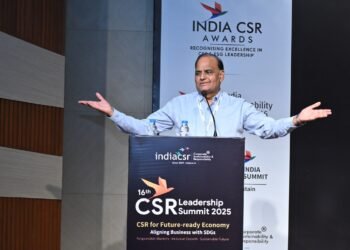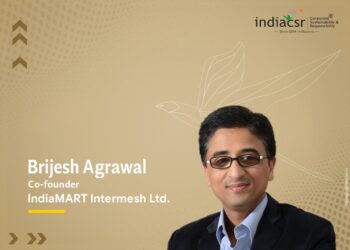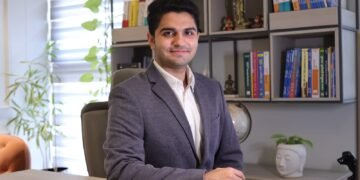In conversation with Rusen Kumar, Editor India CSR; Roma Balwani, President – Sustainability, CSR and Communication, Vedanta Limited talked about Vedanta way of serving the people. Edited Excerpt:
What goals have you set for CSR, Communication and Sustainability?
Vedanta’s goal as a good corporate citizen is to support the development goals of our host communities and nations. To determine the best collaborative approach, we always consult stakeholders with following the principle of ‘free prior informed consent’ and ensure we address the needs of the communities. Hence community-initiated and owned programmes are stronger and more sustainable in the long-run.
We see the importance of sustaining ‘social license to operate’, through understanding social, economic and environmental performance that is linked to community consent. The focus is on proactively building trust for the business, and further the practice of engaging with stakeholders.
At Vedanta, we believe that our people are our most powerful brand assets as powerful brands aren’t built only by the products we produce, but by employees who are the engaged and committed resources within any organization. The aim is to make all employees of Vedanta a part of the team that builds the reputation of the company, as brand ambassadors. It is critical to synergize the company’s values with the employees so that we can capitalize on individual traits to meet the broader corporate objectives.
How do you encourage creative thinking within your team?
My aim is to set an example of not only sharing knowledge, but seeking knowledge too. This approach creates a culture of mutual learning and collaboration, of generating ideas and suggestions without a fear of failure. Such a platform boost innovation and creativity within the team.
At Vedanta, we have an innovation and technology platform called ‘Eureka’ which is a web-based platform to nurture and incubate in-house innovation and technology. ‘Eureka’ went live on May 30, 2016. The platform is a part of Vedanta’s Innovation & Technology programme, which has been created with a corpus of INR 200 crore to fund in-house opportunities for research and development.
What makes you passionate about corporate communications?
A strong reputation of the corporate can capture loyalty and in turn positively affect balance sheets and market cap, reduces commercial risk and insulates the company in a crisis. Today, the world is looking closely at business responsibility and amplifying the voice of organizations who collaborate and understand community needs is vital to build and sustain the reputation of the brand. Any combination of breakdown in capability, judgement or motive will see trust in a brand destroyed. To build a powerful identity with strong ethics, governance and purpose is the challenge which I enjoy undertaking every day and Vedanta as an entity empowers and nurtures the ethos.
Can you name a person who has had a tremendous impact on you as a leader? Maybe someone who has been a mentor to you? Why and how did this person impact your life?
I have been influenced by many who have helped shape my personality, to become self-confident, self-reliant and to shape my own destiny.
However, it has always been my parents who have been role models for me, who have had a positive attitude and simple living.
And my former boss, late Mr. B I Bhambhani who helped me discover and unleash my potential. I am greatly indebted to him as he was a valuable guide and a mentor in my early career and who provided me that opportunity to understand and climb the corporate ladder with working hard, staying focused and always ready to take up any challenge.
What is the most important decision you have made recently?
Importance of the decision is relative to the situation on hand. Every decision plays its role and there have been many decisions in my business and my personal life which have built the path of my journey.
My career moves have been very important as they are a huge influence on my personal well-being.
Do you lead from intuition?
I do believe in the power of intuition, but a whole mind approach enriches it in some way as our intuition is backed by experiences. My decisions are guided and supported in many cases by research and benchmarking, however going that last mile and making a success of it also lies in the power of persuasion rather than imposing it. While I believe constantly learning and unlearning allows me to stay in touch with trends.
How do you react to criticism
By listening intently and reasoning out both views for the benefit of the particular project. Criticism, as long as it is constructive, is an aspect of the consensus-building process, which is vital to the long-term stability of an organization.
What type of recreational activities do you enjoy?
Travel, read books, listen to music and meditate.
What steps do you take to motivate others?
Empowering the teams, while guiding them along the most impactful path and harness the strengths of diverse capabilities works as an effective motivation. When you derive a sense of ownership over their work and make them personally invested in the outcomes, this becomes a source of motivation in itself.
Should a decision maker be right all the time?
The best decisions are those which are backed by previous learnings, current context and the dynamic environment, taken with an open mindset. Imposing one’s opinion on others neither makes business sense nor does it better interpersonal relationships. A decision maker needs to take people along and should demonstrate leadership qualities to make the decision work, which is in the best interest of all. The decision maker may not be always right, however the ability to change gears and react real time to minimize any long term impact is important for a decision maker and to consciously & continuously challenge the status quo.
What are other ways of communicating aside from speaking? How do you utilize non-verbal communication?
Non-verbal cues are just as imperative towards communicating your message. What you speak should not be contradicted by how you say it as it creates a sense of distrust. And your words carry a lot more impact when they are supplemented by the right kind of body language which helps to build trust. To build and utilize these skills, one needs to listen, to quickly adapt and go with the flow and your best learning is by networking, and volunteering to take on responsibility that comes your way. Small and positive gestures
What do you do to ensure you continue to grow and develop as a leader?
In the field of communication, messages that adapt to engage with diverse stakeholders will elicit the required outreach. To make relevant messaging, constant learning, being updated with the latest activities and being engaged with the target audience is imperative. This insight will help manage the brand image in volatile environments, amplifying the values of an organization of having a social purpose that can significantly impact the development of the society at large. Vedanta has given me the opportunity to understand the global commodities market, its impact on economy and communities and open up new horizons. In turn, I mentor young professionals in the organization which is very fulfilling and I love story-telling of my experiences.
What is one characteristic that you believe every leader should possess?
Is a visionary and can steer the organization to achieve stretch targets by creating a culture of outperformance. A good leader always upends the status quo and goes beyond their comfort zone.
What is your perception about Government of India’s emphasis on CSR?
India is one of the very few countries to have made CSR mandatory for businesses, however we are still in the nascent stages of CSR by corporates, in India. The government is trying to create a connect with companies making them responsible citizens, accountable to the community and environment that they operate in. I believe that the impact of the Companies Act (2013) has been far beyond just the 2% mandatory spending for CSR. The law provides a strong framework around which companies are able to build their initiatives. As a result there is more dynamism and competitive spirit among companies to outperform in their CSR initiatives.
The spirit in which this policy has been instituted should be commended. It also puts responsibility on the government and society to ensure that the activities have measurable outcomes.
However, India is a complex country and we need to adapt and be able to ensure that it just doesn’t become a tick box activity. If the impact of the CSR initiative is meaningful, long lasting and creates goodwill, then the amount is now significant as a large database of mid-size companies are now keen to introduce CSR activities and it is the extent of collaboration and empathy which will bring in trust, ownership and belief and help alleviate poverty.
At Vedanta, we strongly believe in the Social License to Operate, which is being in harmony with our host communities, to ensure their development along with economic prosperity that our business brings to the state.
Which is your recently read book?
The One Minute Manager by Kenneth Blanchard and Spencer Johnson. It is timeless as it denotes, what you can achieve; One Minute Goals, One Minute Praisings, One Minute Reprimands.
Who is your ideal personality?
I can’t name one, but there are many who I would like to emulate. Some of whom, who are audacious and successful and live on their own terms with a sense of purpose and become icons. The common denominator that I look for is that they do good but they have their own unique personality traits and all of them leave a positive legacy for the society.
How do you define social leadership success?
When you have to emulate in a small way and contribute you look up to social leaders and the path they have taken. They do believe in good for mankind, they have a following, they are individuals or groups of equals who bring in change. However, more and more corporates want to imbibe those values in their business as it has long term impact. Nelson Mandela is one such example of a social leader who brought in a wave of change, he created history by championing the anti- apartheid movement.
Can you tell me about something you have learned in the past year?
The past year has given me insights into some of the most challenging environments in the business context when Vedanta faced global meltdowns which impacted the commodity markets. I was fortunate to be part of the experience on how Vedanta’s leadership team rallied together under the guidance of our Chairman Mr. Anil Agarwal, realigned the business model to combat the uncertainties of the market and still emerge as a resilient company in times of adversity.
What are you most proud of?
I am most proud of my family, who are my universe which keeps me going, and the set of values that we imbibe together. In terms of the high point in my career graph, I am proud that I have brought communication to the board level as a strategic function in the organizations I have worked in.
What is your favorite color and why?
Red, because it is a vibrant colour. It resonates with me, as it associates with being auspicious and it is colour which makes me feel happy, each time I wear it or see it as an auspicious omen.
What does sustainability mean to you?
Sustainability is best defined where the purpose is to maintain ecological balance, businesses must have such processes that not only impacts profit & people but most importantly the planet. Businesses are not isolated entities. They can thrive with the support of their host communities, whose growth is imperative to sustain the development of the businesses. It is absolutely crucial that every enterprise must introspect on how its existence brings about a net positive impact to the society and its environment.
With regards to profit, using sophisticated data builds a more perfect case for sustainability, for people, influencing stakeholders and driving cultural change and accelerating progress through technology can positively impact the environment. Sustainability can accelerate growth, change culture and drive ‘real purpose’.
How do you incorporate technology change into your personal file?
The fact that we use emails now as the most popular means of communication real time is what one would have never imagined a few years ago, along with the vision that you would be working in a paperless office. Having information on a tap makes life much easier and we seem to have become much used to our smartphones as it is a great enabler for communication. Big data will be the game changer of the future that will help create technological advancement in all aspects of business & economy and we can leverage it for analysis of sustainable long term impact on society at large.
If you could meet any famous leader from the present or past, who would it be? What would you ask if you had only one question?
I would have loved to meet Jawaharlal Nehru and would have asked him, ‘What motivated him in his decisions that changed the course of destiny of India?’
Do you think engagement on social media helps communicate company values, shape a company’s reputation, and grow and evolve corporate leadership in times of crisis?
Yes. Social media has emerged as a critical, conspicuous and timely form of communication that can be leveraged to share the correct messaging with the company’s stakeholders, amplifying awareness on the organization’s activities. Most important is to evaluate and measure the impact of the brand on social media.
Most feedback received on social media is constructive so any substantive criticism of the content can be addressed and responded to honestly. By acknowledging and engaging with the stakeholders on social media, organizations are seen to be transparent in their communication.
You may also like:
- Interview with Jehangir Ardeshir, Group CEO and Director Supervisory Board at Forbes Marshall
- An interview with Roma Balwani, President – Sustainability & CSR, Vedanta Limited
- An Interview with Krishna Thacker, Director, Metlife Foundation
- Yes! India can see the Change via YES FOUNDATION: Prerana Langa
- Deloitte volunteered 143,000 employee hours making difference to over 9,42,000 lives: N.C. Hegde





















